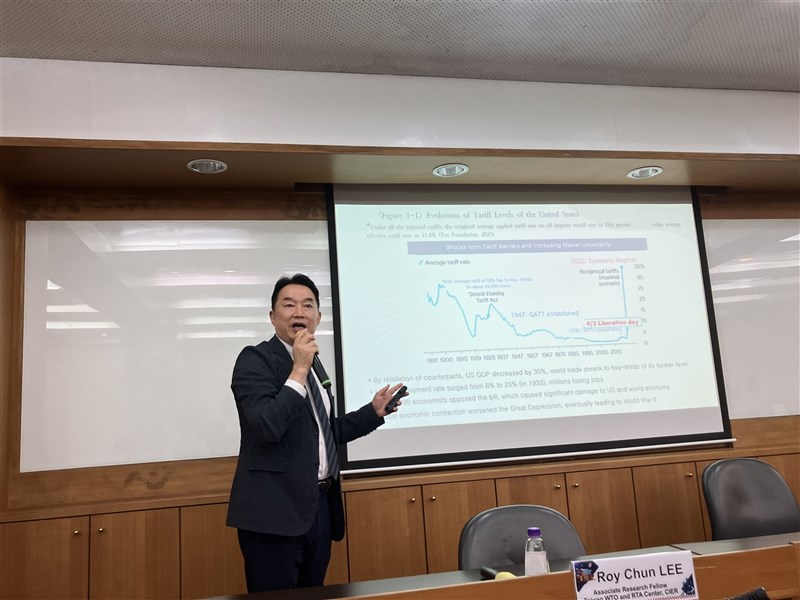
Taipei, Oct. 16 (CNA) South Korean economist Yoon Heo on Thursday advised against using "logical persuasion" in ongoing tariff negotiations with United States President Donald Trump, saying that emotional appeals -- particularly those invoking his "Make America Great Again" (MAGA) slogan -- would be a more effective strategy.
Speaking at a seminar in Taipei hosted by the Chung-Hua Institution for Economic Research, Heo, a professor of international trade at Sogang University, shared insights from South Korea's ongoing trade negotiations with the Trump administration.
Heo, a chief trade and economic security advisor for South Korea, said Seoul employed a tactic to rebrand and repackage its past, present and future investment plans in the United States, emphasizing that the U.S. was already the top destination for South Korean outbound investment in 2023.
During the negotiations, the South Korean delegation even introduced a proposal called "Make American Shipbuilding Great Again" (MASGA), aimed at revitalizing U.S. shipbuilding, Heo said, adding that Trump reportedly responded very positively to the proposal.
According to Reuters, the plan involved building shipyards, training shipbuilders and repairing U.S. Navy vessels -- measures that would help the United States counter China's rapidly expanding naval capabilities.
Heo added that logical persuasion "would not have worked" with Trump. Before a South Korean delegation met with the U.S. president, U.S. Commerce Secretary Howard Lutnick reportedly warned them not to mention the U.S.-Korea Free Trade Agreement, as South Korea's large trade surplus would only anger Trump.
Heo suggested that Taiwan's negotiators could adopt a similar approach. "Rather, you say, 'We want to contribute to your MAGA project. We want to contribute to rebuilding the United States. But we need you to help us persuade our domestic constituents.'"
Former Taiwan envoy to the European Union and Belgium Roy Lee (李淳), who joined the seminar as a discussant, said, "We are negotiating with a friend, not an enemy -- and that's even more difficult."
Lee said the United States is not just any friend, but a "super big friend" that is probably Taiwan's only security provider -- a fact Washington has repeatedly emphasized during the ongoing tariff talks.
He added that the U.S. is also an essential partner in Taiwan's supply chains, technology development and talent training.
Therefore, Lee said, Taiwan has little choice but to agree to "most of Washington's demands" while seeking ways to make up for any perceived harm caused to the U.S.
"The key is really how you communicate and create consensus within Taiwan," he said.
Noting that South Korea put almost its entire domestic market on the table in its negotiations for a free trade agreement with the U.S. 15 years ago, Lee asked, "Is Taiwan ready to do that?"
"We want to have free trade, but we don't want to open up. But we can't have it both ways," he said.
- Culture
- Culture
Taipei Int'l Book Exhibition kicks off
02/03/2026 11:10 AM - Business
U.S. dollar up in Taipei trading
02/03/2026 10:09 AM - Business
Taiwan shares open higher
02/03/2026 09:08 AM - Society
Taiwan headline news
02/03/2026 08:54 AM